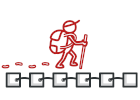
Iterator en Python
Iterator es un patrón de diseño de comportamiento que permite el recorrido secuencial por una estructura de datos compleja sin exponer sus detalles internos.
Gracias al patrón Iterator, los clientes pueden recorrer elementos de colecciones diferentes de un modo similar, utilizando una única interfaz iteradora.
Complejidad:
Popularidad:
Ejemplos de uso: El patrón es muy común en el código Python. Muchos frameworks y bibliotecas lo utilizan para proporcionar una forma estandarizada de recorrer sus colecciones.
Identificación: El patrón Iterator es fácil de reconocer por sus métodos de navegación (como next, previous y otros). El código cliente que utiliza iteradores puede no tener acceso directo a la colección recorrida.
Ejemplo conceptual
Este ejemplo ilustra la estructura del patrón de diseño Iterator. Se centra en responder las siguientes preguntas:
- ¿De qué clases se compone?
- ¿Qué papeles juegan esas clases?
- ¿De qué forma se relacionan los elementos del patrón?
main.py: Ejemplo conceptual
from __future__ import annotations
from collections.abc import Iterable, Iterator
from typing import Any
"""
To create an iterator in Python, there are two abstract classes from the built-
in `collections` module - Iterable,Iterator. We need to implement the
`__iter__()` method in the iterated object (collection), and the `__next__ ()`
method in theiterator.
"""
class AlphabeticalOrderIterator(Iterator):
"""
Concrete Iterators implement various traversal algorithms. These classes
store the current traversal position at all times.
"""
"""
`_position` attribute stores the current traversal position. An iterator may
have a lot of other fields for storing iteration state, especially when it
is supposed to work with a particular kind of collection.
"""
_position: int = None
"""
This attribute indicates the traversal direction.
"""
_reverse: bool = False
def __init__(self, collection: WordsCollection, reverse: bool = False) -> None:
self._collection = collection
self._reverse = reverse
self._sorted_items = None # Will be set on first __next__ call
self._position = 0
def __next__(self) -> Any:
"""
Optimization: sorting happens only when the first items is actually
requested.
"""
if self._sorted_items is None:
self._sorted_items = sorted(self._collection._collection)
if self._reverse:
self._sorted_items = list(reversed(self._sorted_items))
"""
The __next__() method must return the next item in the sequence. On
reaching the end, and in subsequent calls, it must raise StopIteration.
"""
if self._position >= len(self._sorted_items):
raise StopIteration()
value = self._sorted_items[self._position]
self._position += 1
return value
class WordsCollection(Iterable):
"""
Concrete Collections provide one or several methods for retrieving fresh
iterator instances, compatible with the collection class.
"""
def __init__(self, collection: list[Any] | None = None) -> None:
self._collection = collection or []
def __getitem__(self, index: int) -> Any:
return self._collection[index]
def __iter__(self) -> AlphabeticalOrderIterator:
"""
The __iter__() method returns the iterator object itself, by default we
return the iterator in ascending order.
"""
return AlphabeticalOrderIterator(self)
def get_reverse_iterator(self) -> AlphabeticalOrderIterator:
return AlphabeticalOrderIterator(self, True)
def add_item(self, item: Any) -> None:
self._collection.append(item)
if __name__ == "__main__":
# The client code may or may not know about the Concrete Iterator or
# Collection classes, depending on the level of indirection you want to keep
# in your program.
collection = WordsCollection()
collection.add_item("B")
collection.add_item("A")
collection.add_item("C")
print("Straight traversal:")
print("\n".join(collection))
print("")
print("Reverse traversal:")
print("\n".join(collection.get_reverse_iterator()), end="")
Output.txt: Resultado de la ejecución
Straight traversal:
A
B
C
Reverse traversal:
C
B
A